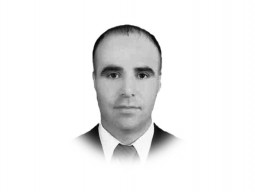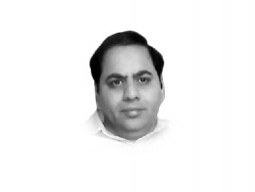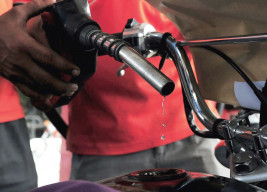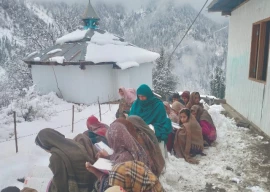
The press conference in Hyderabad might have had some of the older, portlier generation of TV viewers chortling with pleasure, but it was most offensive to the MQM; and it is to their eternal credit that they did not react beyond suggesting that Dr Mirza was badly in need of psychiatric counseling. After emptying both barrels at the MQM, Dr Mirza directed his wrath against the sycophants who surround the president, particularly Rehman Malik, the PPP’s answer to the irascible, petulant Sheikh Rashid of the Q League, whose one-liners and two-tone voice endeared him to the media.
Dr Mirza is being hailed as a hero in parts of Sindh, but his diatribe hasn’t really changed anything in either the province or the country. If anything, it has put a damper on the issue that was being debated in Punjab a fortnight ago: should the army be called out to clean up the mess in the killing fields of Karachi? Supporters and detractors can be found on both sides of the fence. The business community; people who live in Karachi’s Orange County; the daily wage earner in Orangi who is sick of the strikes, protest marches and other types of organised public dissent which deprive him of a living; and the leader of the MQM say it should. The prime minister and spokesmen from the Nawaz Sharif faction of the Muslim League, however, say it should not, possibly because they have a lurking fear it might eventually lead to the return of the former military dictator. Asma Jahangir, president of the Supreme Court Bar Association, voicing the views of a small chorus of dissenters, also says it should not — not because she has any particular distaste for the army, but because in her opinion it would lead to the usurpation of the fundamental rights of the citizen.
Now I have two questions for Ms Jahangir, whom I have always held in the highest esteem and have admired for her long and hard struggle to protect the rights of women and the establishment of civil rights in this country. Would she have expressed the same view had she been residing in Orangi and her office had been located in Jacob Lines? And just what are the fundamental rights of a citizen in a country where there is no rule of law, where a man gets off scot-free after stoning and killing his wife under the guise of upholding family honour, where rapists are protected by the police and where a prime minister obstinately refuses to implement the decisions of the Supreme Court?
Some time ago, the MQM leader exhorted the prime minister to stop the genocide of muhajirs in Karachi, and added that if he can’t stem the tide he should resign. One shudders to think who his replacement would be as the public perception is that all members of the current politburo in Islamabad are cloistered in wombs of the same sly mould. It was decided to deploy the Rangers and the police, and the armed personnel appear to have brought matters under control. But has anybody bothered to ask what will happen once the men in uniform are withdrawn? The hitmen from the political parties will once again crawl out of the woodwork and it will be business as usual. What is required is a permanent solution, and it is incumbent on the country’s leaders to find it. The case for army intervention is that the country would be dealing with a highly trained professional agency totally objective in the execution of its duties. In case the president decides to chance it and brings in the army, Aitzaz Ahsan will tell him that such a move would not be unconstitutional. What people have in mind is the sort of operation that the army conducted in Swat.
The real issue before the decision-makers therefore is: should whatever civil liberties the citizen still enjoys be protected at the cost of increasing genocide, when a remedy is available? The prime minister and the president prefer the Rangers-police deterrent because, as they so charmingly put it, ‘it would be good for democracy’. There is every reason to believe that both the president and the prime minister are sincere in their desire for peace. But they appear to have missed the full quilt. Let’s hope they are on the right track and have made the correct choice. They must remember that the people of Karachi are exceptionally tough and resilient and have brought down many an administration. The primary duty of a government is to ensure the protection of its citizens. And if the regular paramilitary forces cannot prevent planned homicides, the government would have no option but to turn to the military for help. At present the armed forces have expressed a certain reluctance to get involved. But if things really get out of hand, they will be called upon to exercise their patriotic duty.
Published in The Express Tribune, September 7th, 2011.
COMMENTS (13)
Comments are moderated and generally will be posted if they are on-topic and not abusive.
For more information, please see our Comments FAQ



















@Yasser:
"Bhayyas " of Karachi are now really playing "Hide and Seek".
"Saaf Chooptey Bhi Nahee Samney Atey Bhee Nahee".
Mussarat
@Nadir El-Edroos: Why are you so afraid of Army's deployment to stop the shedding of bloods of hundreds of innocents on Karachi's street. Only because the MQM demanded it???? Only the prospect of Army's intervention in Karachi has finally led to a modicum of serious operations in Karachi and we have a little respite these days. Otherwise the PPP administration had vowed to take no steps and let the mayhem continue unabated no matter how many lives were lost.
It is a well practiced tradition in all the countries of the world to call in the army in extra-ordinary situation. From the 1960s, when the Army was called in by US in Kent, Ohio and Chicago, and in many other cities too numerous to mention, to counter anti-war protestors to the 2000s in Gujrat where India's President deployed the army after the massacre in Gujrat by Narendra Modi's forces, it is a common practice to call in the national forces if local police and law-enforcement personnel cannot deal with situations. It is a tragedy of immense proportions that the blood of so many people is shed and the Army was not called in, knowing fully well that the local administration was not serious in doing anything to counter it. Actually, I have to go a step further and say that not only the local administration did not show any intent to stop the bloodshed they were actively encouraging and abetting it. Otherwise what is the reason of former Interior Minister's statement in which he admitted 300,000 arms license to his people and recruiting 10,000 policemen where according to him he made sure that not one was Urdu speaking?????
The phrase about the army doing their "patriotic duty" has caused much anst in the past. They usually end up doing it for ten years.
"The case for army intervention is that the country would be dealing with a highly trained professional agency totally objective in the execution of its duties."
I seriously doubt the professionalism of an Army that runs bakeries, dry cleaning shops, and real estate agencies as a side business, sees no harm in walking in every ten years and sticking around for ten more for a free-for-all party, and has yet to conduct free, open trials on fiascos such as Kargil, GHQ Attack, and the more recent Mehran Base episode. Not to forget finding OBL in their own backyard. Please grow up, and shed this perception of the "best trained, highly professional force" that we have been fed over the years in return for slices off our education and health budget.
Patriotic duty? We have not reached calamity level which would mean civil war or the start of a militia led gang wars, yes the situation is serious and needs to be resolved but lets not jump to another problem. What needs to be done with immediate effect is to bring political parties together and find a solution which helps the people of Karachi irrespective of their ethnicity or political affiliation. Any military intervention will eventually lead to further problems, havent we learnt from our past experiences (East Pakistan, Baluchistan).
Very well said. The author has anaylsed the Karachi situation very realistically. I am on the same page with the author and so are the Karachiites who know the pain and sufferings they have been enduring and seeing the worst nightmare.This time around they have been jolted to a rude awakening at the self ceneteredness of all - includes political leaders, police, rangers and the silent action-less army. The Karachiites wonder what good is the law enforcement that is being paid and for what?? and whose protection? on the contrary they have been the silent spectators of the bloodbath. The lack of timely response in Karachi is responsible for this mess. Indeed, a Swat type Military intervention in Karachi could have prevented this mess.
Karachi needs justice not discipline! I totally disagree with Mr. Mooraj's analysis of the entire situation and how it should be dealt. Present is a reflection of our past, and we've made some grave mistakes in the past that have had these consequences. Calling in the army to stem the lawlessness in Karachi would be a stop-gap arrangement....I'm afraid it has ALWAYS been. Pakistan's as well as world history has shown that army deployments have never been solutions to such intractable problems like one we face in Karachi. Karachi has always been a microcosm of Pakistan, reflecting all the good and bad things in the country; ethnic divisions and their unity, commercial progress, ideas, a cauldron of all the races, religions, sects scaterred across the country. Someone who settles karachi's problems, would go on to settle the fundamental problems of Pakistan. To do this for once and for all we need to come of this short-termism and living by the day attitude, as reflected in Mr. Mooraj's suggestion of 'bringing down the hammer to force a square into a circle'. The solution should be through civilian departments/institutions/efforts. Involvement of military in solving problems across Pakistan (East Pakistan, Balochistan, FATA, SWAT, Red Mosque, Karachi or anywhere else) has weakened us. THERE ARE NO MILITARY SOLUTIONS TO POLITICAL PROBLEMS anywhere in the world. Instead of calling in the military, we ought to stress on making police nonpartisan. This would serve us not only in the short-term but would also increase our faith in our civilian departments and the govt machinery/institutions . Mr. Mooraj, we need to rid ourselves of this mentality of calling out the army at every juncture.Such acts distort the civil-miliatary equation and take us to square-one with history repeating itself too often in Pakistan. Above all it creates new set of tensions with repercussion for the army (punjabi army, mohajir army, pathan army) etc. Lets not get them into this political mess. Military actions within create irrepairable divisions. You have functioning courts, take the damn elected representatives to courts accusing latter of failure to perform their constitutional duties. Hold them accountable and correct what has gone wrong with Pakistan instead of giving us to some silver bullet solutions like IMF. There are no short cuts to progress, unity, and faith. Nations have to suffer to get things right. Don't let this suffering go to waste by proposing to short-circuit responsilities of civilian instutions. Instead hold them accountable. Long live my country.
what is the solution then if as you say that president is surrounded by syncophants,prime-minister can not be replaced because one shudders when he sees those who may replace him as they are of the same lot,you further say that army,rangers or police is not the solution.the solution you give is that "government"will have to take the decision,the same government whose several shortcomings you have pointed out? then who else?why dont you yourself come-out and give some tangible solution,it will be a great favour to this poor nation,
This is an insightful analysis by someone who knows Karachi and can write in unambiguous terms. The author did not pussyfoot around to hide the blame from some parties and assign blame in disproportionate terms to others. He has raised a point that will behoove us well to understand and insist that it is implemented. That point is that the fundamental responsibility of the Civil Society is to insist that innocent lives are protected and demand from the Government that either they do that or leave. The nil factor i.e: to just sit there and do not do anything will not work at all. If Karachi's situation is not tackled appropriately by the Government, extraordinary forces will come into play to insure that peace and security is restored. The country and its' people are sitting at the edge of an economic abyss. Neither the Government nor the Armed Forces can afford the resulting calamity. Therefore the workings of the natural laws will insure remedial action to put the City back to normalcy. The Government does not have a choice here.
Wow! So the Pakistani military should not undertake operations in FATA against known terrorist sanctuaries because we dont want to be seen doing America's bidding, but calling in the military to intervene in Karachi is their "patriotic duty"? How have previous interventions turned out? Was the military intervention in the 1990s a big success? If the police is failing in their responsibility it shouldnt come as any surprise. It remains understaffed, under trained and under resourced for decades. Why doesnt anyone call for revamping and fixing the institutions whose job it is to maintain peace within the country rather than calling on the military which already has its hands full?
While you criticize Ms. Jahangir and question whether she would have the same views if her office were located in parts of Karachi, its also very easy for the rich and well connected to call on the sons of the poor to put their lives at risk in operations which are bound to fail. The military will not be seen as a nuetral arbitrator and eventually one political or ethnic group will feel that they are being persecuted unfairly, which will suck the military into another quagmire that it can ill afford. Local governments and local police forces around the world deal with community level policing and security. Why not strenghten them? Give the people whose job it is a chance to get on with it.
Its shameful that this author believes that the Army is performing its "patriotic duty" to intervene, when day in and day out, an underpaid, undertrained and demotivated policeman puts his life on the line, only to be ridiculed in pages such as this. Thanks for offering a solution that will surely perpetuate violince in Karachi.
Thanks for writing this piece Mr. Anwer, which is surely the sanest of the piece on this whole fiasco, it was indeed MQM who forces PM gilani to give rangers power in the city and since then situation is getting under control and i agree with your wordings "They must remember that the people of Karachi are exceptionally tough and resilient and have brought down many an administration"